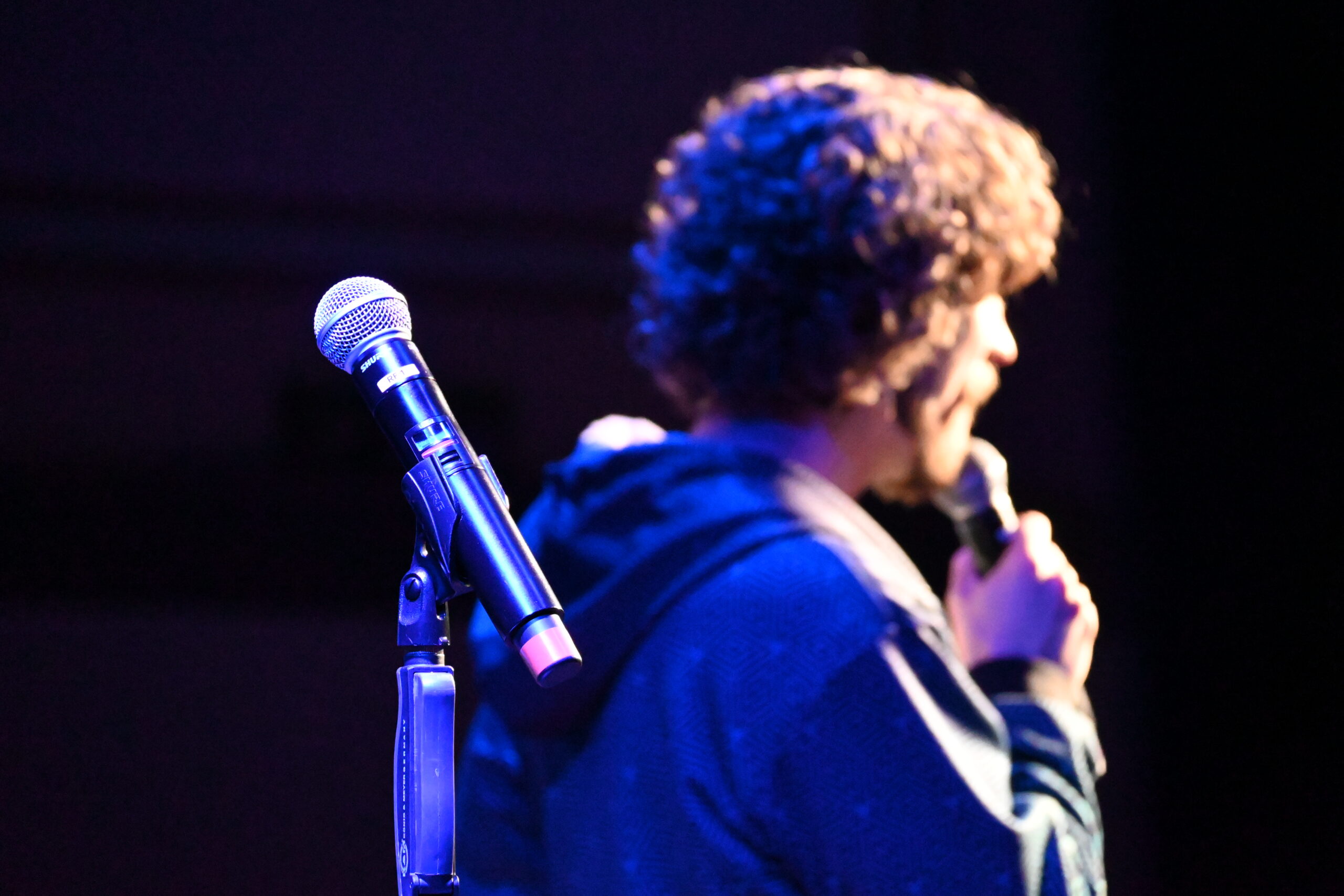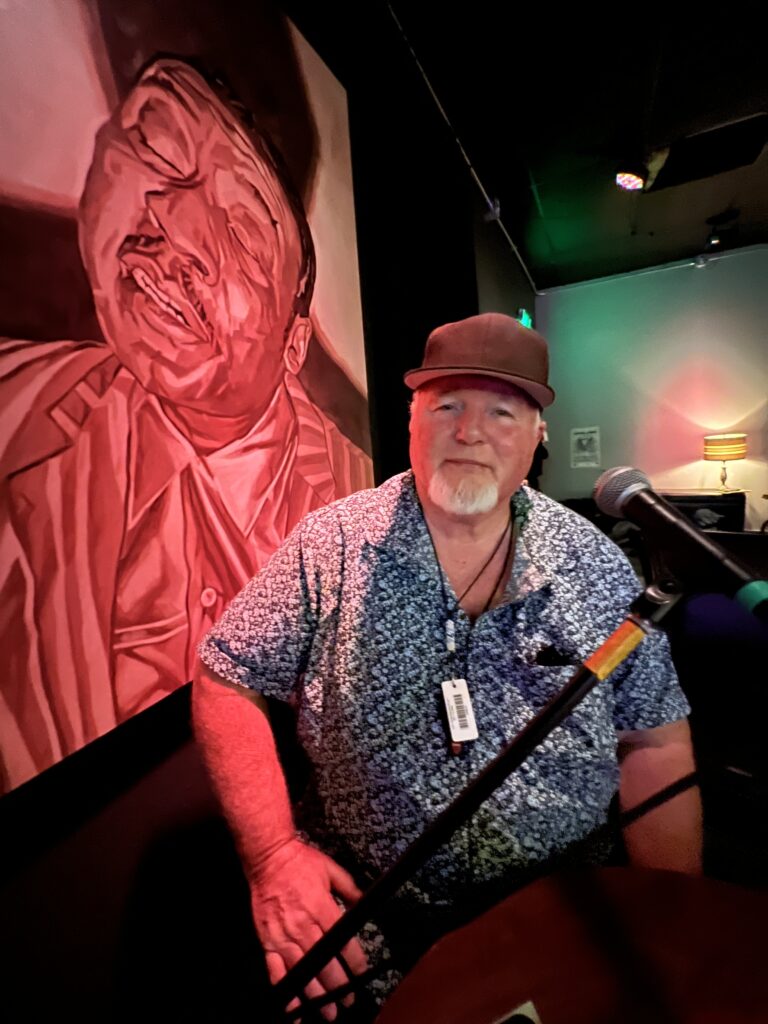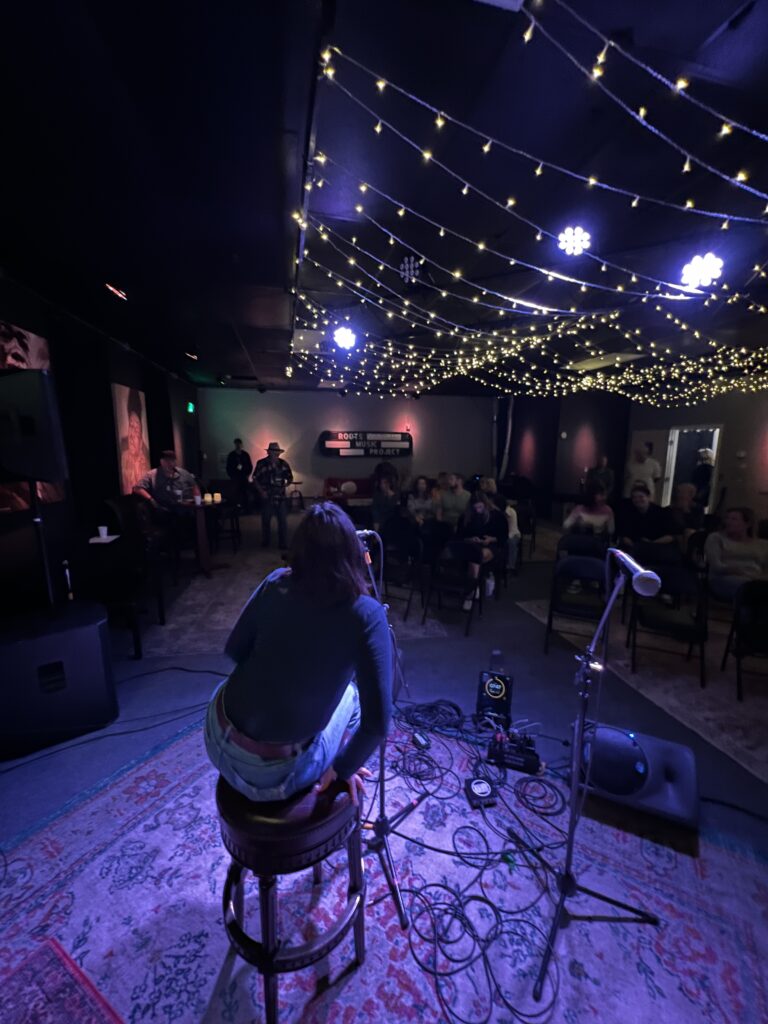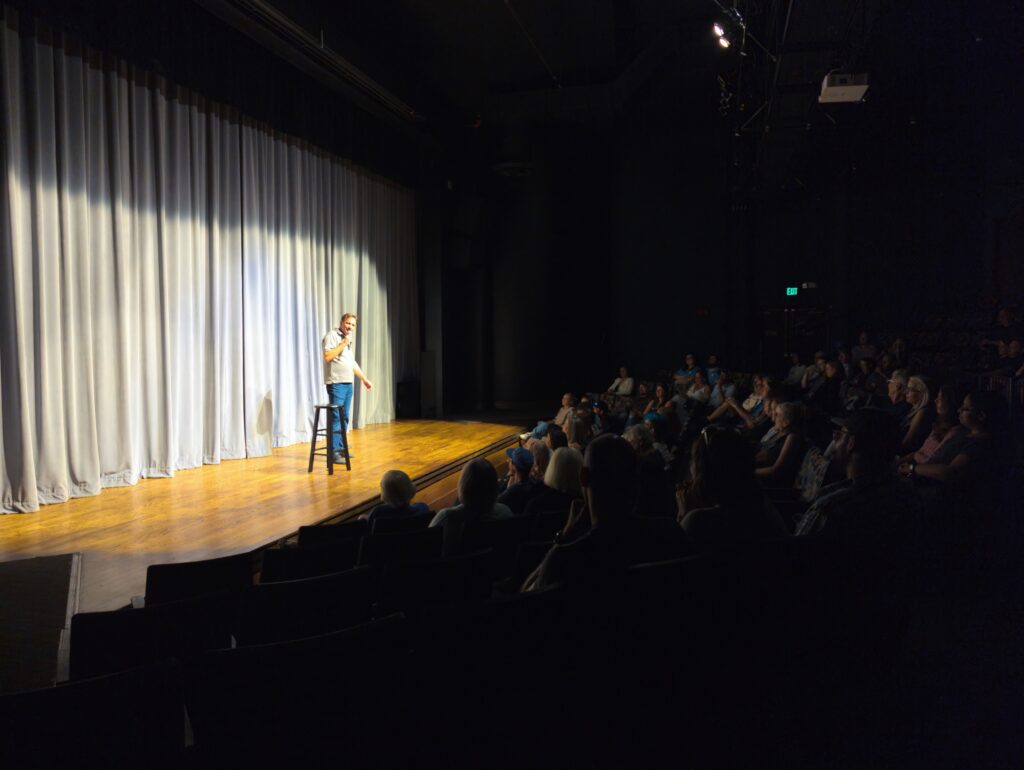
The man on the stage strums his guitar and croaks out a song. His voice falters on the high notes. His fingers fumble on the strings. At one point, he pauses and mumbles an apology for his mistake.
In the audience, no one snickers or cringes. No one looks away. Instead, they shout encouragement, and the man begins again with a smile.
As he strums the final chords and warbles the last few words, there is complete silence. He has drawn everyone, collectively, into all this song means to him and all it has cost him to play it — every hour spent learning the placement of his fingers on the strings, each private rehearsal in his home or on drives to work, committing the lyrics to memory.
There is nothing polite in the applause he receives; these are people who know exactly what it takes to be here, and they celebrate each person brave enough to show up.
This is Sober Night Live at Roots Music Project, an open mic night by and for people in recovery from substance use — or simply the sober-curious, a concept that has grown in popularity in recent years.
Spaces free from the omnipresent influence of intoxicants are hard to come by.
And while the general public has never had more choice when it comes to spirit-free drinks and events, performers still find their options limited.
Artists all across the Front Range are building their own sober spaces, online and in the physical world, providing critical support for creatives to pursue their art and sobriety simultaneously.
“A lot of people are like, ‘Society is going downhill,’” says David Kennedy, Roots’ executive director. “The sober movement, that’s something that’s getting better.”
Rock-n-roll myth
From Van Gogh to Steve-O, making art is inextricably linked with drinking and using drugs. The exploration of why that is could fill several books. Ryan Dart believes it has to do with the fear of rejection.
“You have to be so vulnerable to share that creative output with other people,” says Dart, a musician and manager of Colorado acts like Elephant Revival and Rose Hill Drive. “I’ve been writing songs for 25-plus years, and a new song is such a vulnerable space to share with other people. I still get those feelings, those nerves, those butterflies.
Drugs or alcohol are “an escape from that anxious place of how their art is going to be received.”
Substance use can also put distance between themselves and the art they create, Dart believes. A lyric or a painting can reveal so much about the artist, a level of vulnerability that can be uncomfortable.
“It’s a way to not have to feel responsible for the origin of their art, you know?” says Dart, who has been sober for about seven years. “It gets them off the hook of having to relay how they were inspired to write this thing or do this painting.
“It’s safer to close that window to the soul.”
The association between mind-altering substances and meaningful creativity is especially prevalent in the music business — what Dart calls the “rock-n-roll myth” and Kennedy refers to as “the mystique of the musician under the influence.”
“I’ve even had teachers recommend, ‘Maybe you ought to smoke some weed and try to do some songwriting,’” Kennedy says. “I’ve been to rehearsals with bands in the past where everybody is using.”

The vast majority of music venues serve alcohol. Particularly for those newly in recovery, that takes performing or even attending shows off the table.
Brooke Delgado, a singer-songwriter and student at CU Denver, interviewed sober musicians for her master’s thesis. She has talked to 18 people so far.
In her research, participants told Delgado they “put music down at the beginning of their recovery, and they pick it up later,” she says. “That would be something I’ve heard more than once.”
Paul Soderman, a fixture in the local music and recovery scenes, didn’t step foot in a bar during his first five years of sobriety. After that, “I was in bars more than heavy drinkers. I was safe. I could be around booze, I could take secondhand weed smoke, and it didn’t bother me.”
Today, he has 41 years of sobriety to his name. He celebrated his 40th year of being clean with a party at Roots Music Project.
“It’s hard to be 90 days sober, 30 days, zero days,” he says. “It’s easy to do 40 years.”
Raw and real
Sober Night Live feels like a mixture of entertainment and an Alcoholics Anonymous meeting. Professional lights, sound and an emcee elevate the event above many open mics. But there’s a camaraderie and communal vibe that set it apart: Guests introduce themselves to newcomers; free pizza and soda, provided by an attendee, were available to all.
Then there are the performances themselves: comedy, poetry and music interspersed with tidbits from personal healing journeys. Polish is replaced by vulnerability; politeness exchanged for genuine appreciation and welcome.
“There’s a rawness I didn’t see elsewhere,” Delgado says. “You go to a regular open mic, people are out there releasing music, playing gigs, performing. You got to a sober open mic, and you’ve got someone who is reciting poetry or writing a song for the first time.

“You’re probably not going to do that at a bar where you’re background music,” she adds. “You want people to listen to you.”
“A lot of these folks haven’t performed music sober in decades,” Kennedy says. “They just need a safe place to prove to themselves that they can do it.”
For years, Soderman hosted a sober open mic for Boulder nonprofit AIM, which helps young adults get help with substance use and other behavioral health issues, until the event lost its physical space. Roots stepped in to fill the void.
Soderman wants to draw younger artists to Sober Night Live, and hopes participants with more sobriety under their belts will continue to share their stories alongside songs and poems and stand-up routines — even if they’re “shaking, scared, off-key” — to set an example for folks new to or not yet in recovery.
Ideally, he says, every performance should engage with the healing journey in some way. “I want to hear songs that speak to us. I don’t want to hear another Neil Young song.”
‘Something is happening’
For the newly sober, finding alcohol-free places and people is the obstacle. For venues, it’s the cost to provide those spaces.
Even with volunteer labor, it isn’t free for Roots Music Project to host Sober Night Live.
“Just to have a space, pay rent and insurance and clean it and have somebody to schedule it is about $1,000 a day, for our space,” Kennedy says. “I know that seems ridiculously high, but it’s the reality of it. The business model is challenging, really challenging.”
Some venues charge more for sober events, according to Joe Huisman, founder of Second Chance Comedy, a show by, for and about people in recovery. Or the event will become sober-ish, with alcohol available for sale even if most people there aren’t drinking.
Huisman doesn’t like it, but he doesn’t have a lot of options.
“One of the biggest challenges is finding venues,” he says. “I do think it does limit the audience. Some people will come if there’s a full-sober show and others probably won’t. And probably the other way around.”
The show features performers who “have had a personal relationship with addiction,” either directly or through family members, friends or loved ones. The shows are typically about addiction and recovery and are a mix of comedy and storytelling. Twenty percent of ticket sales benefit Sobriety House, Colorado’s oldest licensed treatment center.
Some venues take extra steps to support the mission. Dickens Opera House in Longmont actually removed all the liquor bottles from the bar for Second Chance Comedy shows there.
“That’s a lot of work,” Huisman says. “I was really impressed by that.”

And there is a flicker of hope as the offerings of mocktails and non-alcoholic beer expand. While sales of traditional beer are at their lowest level in 25 years, the alcohol-free beer market is booming, projected to reach $37 billion by the end of the year. It’s a global phenomenon: In Germany — land of the liter — non-alcoholic beer sales have doubled in the past decade.
“Something is happening,” Huisman says. “People are looking for healthier things to do other than just get messed up.”
An expanded drink menu will be what finally turns the tide for venues, Dart predicts.
“That’s probably the thing that’s going to push change,” he says, “is these businesses actually able to make money.”
One step at a time
For now, those in the sober community are doing what they can to keep it going — and growing.
Dart is launching a podcast, Creating While Sober. He and Eric Singer, an executive producer at Boulder’s Coupe Studios, will be interviewing artists and performers about the intersection of creation and sobriety. They’ve recorded three episodes so far and plan to release the show when they have five to six done. They plan to record the next Sober Night Live on Dec. 3 for an episode
“It’s important to have those people in the community creating that space,” Dart says. “It’s a gift.”
Huisman has Second Chance Comedy shows planned up and down the Front Range. He’s looking to broaden the group of performers to include more diverse voices — all while staying true to the mission.
“There’s a joke that it’s easy to get comedians to go to AA because they’ll do anything to get a microphone,” he says. “I don’t want people who are looking to get on a comedy show. The authenticity is more important than the jokes per minute.
“If we don’t stick to that brand, it just becomes another comedy show.”

As for Sober Night Live, Kennedy and Soderman are working to engage Boulder County’s various rehabs, transitional housing and sober-living homes. They are looking for financial sponsors and hope to grow into the main space; right now, the recurring events, held the first Tuesday of the month, are in the smaller, adjacent room — one without a bar.
Sobriety isn’t a requirement: “It’s open to everybody,” Soderman says.
Kennedy sees Sober Night Live as part of Roots’ larger effort to support musicians’ wellbeing. They already ask visiting performers if they want a sober green room, and work hard to enforce it. Their yearly Rootstock fundraiser festival — coming up on Nov. 30 — has a dedicated space for sober artists, and they’re working on a “decompression lounge” for next year.
“I see this as a cornerstone to a bigger recovery support effort on our part, a bigger plan, making sure our musicians have access to mental health care, safe places when they perform, having it be part of our culture.”
Like recovery, Kennedy says, “we’re just taking it one step at a time.”
ON STAGE: Sober Night Live. 6:30-8 p.m. Tuesday, Oct. 3, Roots Music Project, 4747 Pearl St. Suite V3A, Boulder. Free (donations accepted)
Second Chance Comedy, 7-9 p.m. Thursday, Dec. 5, The Lincoln Center - Magnolia Theater, 417 W Magnolia St., Fort Collins. $28. More dates and venues: secondchancecomedy.com/shows
Related: Does 'California sober' count?
